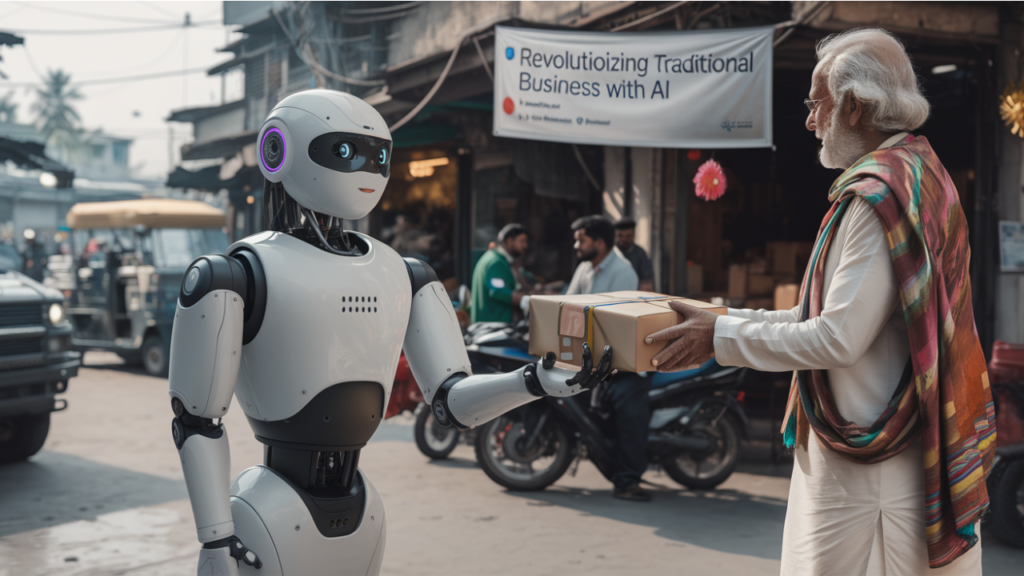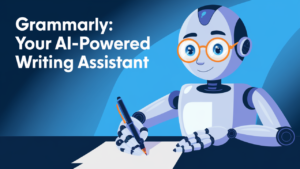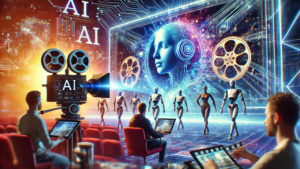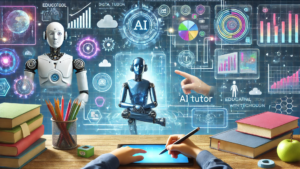Revolutionizing Traditional Business in India : Artificial Intelligence

Revolutionizing of Traditional Business in India Has Already started within industries across the globe, and India is no exception. Traditional businesses in India are adopting AI at an accelerated pace to enhance efficiency, reduce costs, and provide better customer experiences. From retail to manufacturing, and banking to healthcare, AI is enabling businesses to stay competitive in a rapidly evolving digital landscape.
In this blog, we will explore how AI is affecting traditional business in India, the opportunities it offers, and the challenges it presents.
The Role of Artificial Intelligence in Revolutionizing Traditional Business in India
India’s diverse economy is a mix of traditional practices and modern technologies. While many businesses still rely on age-old methods, the introduction of AI has provided new avenues for growth. AI technologies such as machine learning, natural language processing, and automation are helping businesses operate more efficiently.
- Automating Routine Tasks
Traditional businesses often involve a large number of repetitive, manual tasks. AI-powered automation tools are streamlining these processes. For example, in the manufacturing sector, AI-driven robots and machinery can perform tasks like quality control, assembly line monitoring, and inventory management with minimal human intervention. This reduces human error, improves productivity, and saves time. - Improving Customer Experience
AI is reshaping how businesses interact with customers. Chatbots and virtual assistants, powered by AI, allow companies to provide 24/7 customer support, improving customer satisfaction. Retailers in India are using AI-powered recommendation engines to suggest products to customers based on their browsing history and preferences. This personalized shopping experience not only boosts sales but also fosters customer loyalty. - Optimizing Supply Chain Management
AI is proving to be a game-changer for supply chain management in traditional industries. AI algorithms can predict demand fluctuations, optimize routes, and manage inventory in real time. For instance, in the agricultural sector, AI is helping farmers predict weather patterns, monitor crop health, and optimize irrigation practices. This minimizes wastage and improves yields, directly benefiting businesses that rely on agriculture for raw materials. - Enhancing Financial Services
The financial sector in India is experiencing a significant transformation due to AI. Banks and financial institutions are using AI to detect fraud, assess creditworthiness, and automate back-office operations. AI-powered tools are also being used to provide personalized financial advice to customers. This not only increases the efficiency of financial services but also improves decision-making processes.
AI’s Impact on Job Market and Workforce

While AI is bringing immense benefits to traditional businesses, it is also raising concerns about its impact on the workforce. Many fear that AI will lead to job losses, especially in sectors that rely heavily on manual labor. However, experts argue that while AI may eliminate some jobs, it will also create new opportunities.
- Job Displacement vs. Job Creation
AI is automating repetitive tasks, but it is also creating new roles in data analysis, AI programming, and machine maintenance. For instance, businesses in India are now hiring AI specialists, data scientists, and automation experts to implement and manage AI technologies. Reskilling and upskilling the existing workforce is crucial to ensure that employees can adapt to the new AI-driven landscape. - Augmenting Human Capabilities
AI is not just replacing human workers but augmenting their capabilities. In sectors like healthcare, AI tools are assisting doctors in diagnosing diseases, analyzing medical data, and even suggesting treatment plans. In manufacturing, AI-powered machines work alongside human workers, increasing overall productivity without replacing the human element.
Challenges of AI Adoption in Traditional Indian Businesses
Despite the numerous benefits AI offers, there are several challenges that traditional businesses in India face when adopting this technology.
- Lack of Infrastructure
Many traditional businesses in India, especially small and medium enterprises (SMEs), lack the digital infrastructure needed to implement AI. High costs associated with AI technology, limited access to high-speed internet, and inadequate data storage facilities are significant barriers to adoption. - Skills Gap
There is a shortage of skilled professionals who can design, implement, and manage AI systems. To fully leverage AI, businesses need employees who are well-versed in data science, machine learning, and programming. However, many traditional businesses in India are struggling to find such talent. - Data Privacy and Security
AI relies heavily on data to function effectively. However, the lack of stringent data privacy laws in India raises concerns about the security of sensitive information. Businesses need to ensure that they have robust data protection measures in place to prevent breaches and misuse of data. - Cultural Resistance
Many traditional businesses are hesitant to adopt AI due to cultural and organizational resistance. Business owners and employees may fear the unknown or be resistant to change, particularly if they believe AI will replace human jobs. Overcoming this resistance requires clear communication about the benefits of AI and how it can improve overall business performance.
The Future of AI in Indian Businesses
The future of AI in traditional Indian businesses looks promising. As AI technology becomes more accessible and affordable, even smaller businesses will be able to take advantage of its benefits. Government initiatives like Digital India and Skill India are also playing a crucial role in promoting AI adoption and preparing the workforce for the future.
In the coming years, we can expect AI to become an integral part of Indian business operations. From improving customer experiences to optimizing processes, AI will continue to reshape the way traditional businesses operate.
Conclusion
Artificial Intelligence is no longer a futuristic concept; it is already Revolutionizing Traditional Business in India. While there are challenges to overcome, the potential benefits of AI far outweigh the risks. Businesses that embrace AI will be better equipped to compete in a global market, improve efficiency, and provide superior products and services to their customers. The key to success lies in understanding how to integrate AI into existing operations while preparing the workforce for the future.
By embracing AI, traditional businesses in India can unlock new opportunities for growth and innovation, ensuring long-term success in an increasingly digital world.
#ArtificialIntelligenceinIndianbusinesses #AItransformationintraditionalindustries #AIinIndianmanufacturing #AIandautomationinIndia #ImpactofAIonIndianeconomy #AIincustomerserviceIndia #AIinIndianagriculture #AI-drivensupplychainmanagement #AIjobmarketinIndia #AIinIndianfinancialservices #BenefitsofAIfortraditionalbusinesses #ChallengesofAI #adoptioninIndia #FutureofAIinIndianbusiness #AIadoptioninsmallandmediumenterprises(SMEs) #RoleofAIinIndianbusinesstransformation
To keep your self updated with the latest Tech & AI news Follow us on aarvicor








